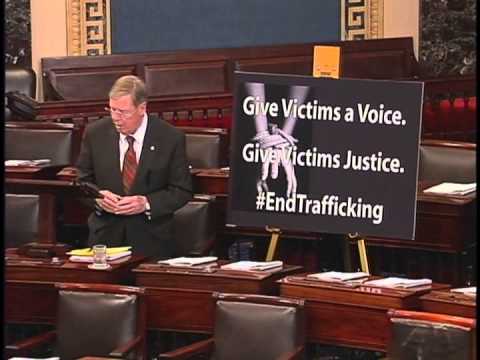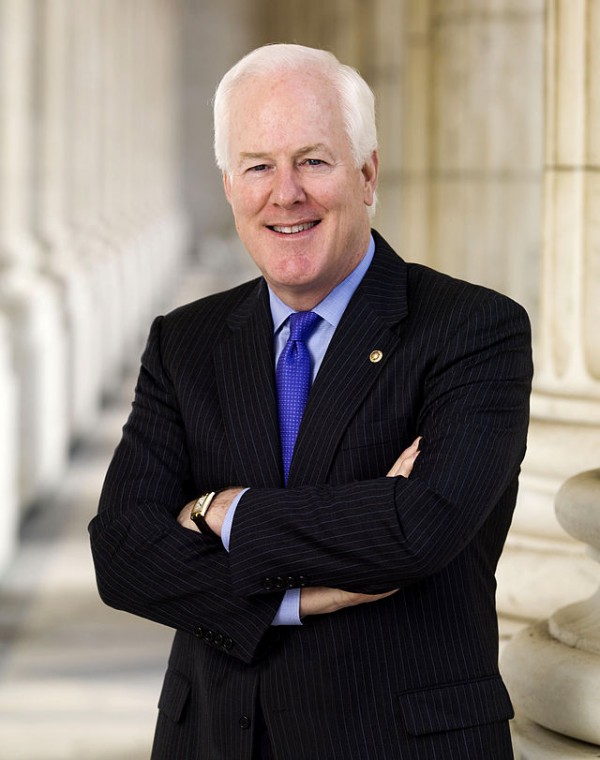
On Wednesday, the Justice for Victims of Trafficking Act of 2015 [S. 178] passed through the Senate by a unanimous vote of 99-to-0. It is being celebrated as a heroic example of bipartisan cooperation for humanitarian advancement. However, if the bill continues to pass through the House, it will be delivering its system of protection over tapped wires, via an increasingly militarized police force.
Introduced by Senator John Cornyn (R-TX), the majority whip, the Justice for Victims of Trafficking Act of 2015 is nothing short of a carceral mandate. Its primary function is to allocate funds and special privileges to law enforcement and immigration control and to legitimize the adoption of new surveillance technologies, purportedly in order to combat child exploitation.
Democratic opponents delayed the bill in committee for six weeks, debating over whether fines collected from criminal offenders could go towards funding abortion services for trafficking survivors. They argued that Republican lawmakers were trying to throw an anti-abortion rider into the bill, extending the Hyde Amendment of 1976 (which prohibited federal funding of abortion), to apply to non-taxpayer funds. To break the stalemate, Senate majority leader Mitch McConnell (R-KY) put pressure on Democrats to pass the bill by asserting that until the legislation has gone through the Senate, he would not schedule the confirmation of Loretta Lynch, the first black woman to be nominated for Attorney General.
On Tuesday, given much pressure on both sides to move the bill along, a compromise was reached in which a separate pool of money would be created for survivor health services, in addition to money collected from criminal offenders for non-health-related services. The fund stream for survivor health services would already be covered by the Hyde Amendment, and thus could not be used for abortions for trafficking survivors. However, the language of the bill as it was passed ensures that the Hyde Amendment’s reach will not extend further to private funding.
While Democrats in support of reproductive justice and civil liberties have been vocal on the legislation’s language about abortion, they have paid less attention to the ways in which this bill also promotes the militarization of police, expands the carceral system, and funds the use of wiretapping and other surveillance technologies by immigration control, with little transparency or oversight. The amended legislation contains some benevolent provisions for increasing victim compensation and funding social services for survivors of human trafficking. However, in addition to these victim-centered services, there is a clear law-enforcement-centered strategy in the bill for addressing human trafficking, which prioritizes the expansion of funding for law enforcement and immigration control.
Several sections of the bill demonstrate the way in which the bill is designed to enhance the militarization of police:
1) Recruiting wounded and retired veterans into special “Hero Corps” to rescue child trafficking victims [Sec. 302]—Former combatants, who have been trained to kill on sight with deadly firearms, and experience a high incidence of post-traumatic stress disorder, will now be exposed to highly sensitive and complex situations, predominantly in neighborhoods already vulnerable to police brutality. Furthermore, these “heroes” are misinformed by Hollywood tropes about pimps and victims, and egged on to perform “rescue missions” with frustrated fantasies of military heroism. They will be patrolling communities that are not their own, where more often than not it is shared economic coercion, not violent abduction, which links the pimp or trafficker to his or her “victim,” revealing a much more nuanced picture of exploitation than the one in which these “heroes” may be prepared to intervene.
2) Funding wiretapping initiatives [Sec. 203] and a Cyber Crimes Center [Sec. 302] specializing in computer forensics and internet surveillance technologies to be used by the U.S. Immigration and Customs Enforcement (ICE), which will be authorized to collaborate with the Department of Defense to monitor the telecommunications and activities of immigrants, border residents, and foreign nationals, allegedly in search of foreign viewers of U.S. child pornography. According to the bill, the Cyber Crimes Unit (CCU) also enhances ICE’s ability to combat “cyber economic crime, digital theft of intellectual property, [and] illicit e-commerce,” among other economic crimes on the internet.
The use of moralizing language to justify increased funding for policing and surveillance is not a new phenomena – laws banning pornography in the UK coincide with increased government surveillance of the private lives of its citizens over webcam. The many clauses related to child pornography in the JVTA bill also allocate funding to “investigative capacity building” in the cybersecurity units of Immigration and Customs Enforcement, as well as funding for “enforcement operations” and “training for Federal, State, local, tribal, and foreign law enforcement agency personnel upon request.” The Child Exploitation Investigations Unit, which will be created for this function, is tasked with “data collection,” and required to collaborate with immigration control through the Department of Homeland Security, and the Department of Defense through the Hero Corps. [Sec. 890] Whether or not JVTS ultimately passes with this language intact, it introduces a precedent for funding for the next wave of militarized surveillance to be justified through the moral panic of child pornography, riding quietly on politically popular bills on issues like human trafficking.
3) Prioritizing funding for paying law enforcement salaries and creating new units of judicial prosecutors equipped with the authority, resources, and expert training to investigate and monitor potential victims of human trafficking, in partnership with health and social service organizations that are encouraged to collaborate with law enforcement, sharing information to enable the ongoing supervision of people involved in trafficking cases, regardless of criminal charge.

The bill would also federalize End Demand measures against child prostitution by charging underage sex workers’ clients as human traffickers, whether or not they know their sex worker is a minor. The Justice For Victims of Trafficking Act as it passed in the Senate also includes the language of another federal trafficking bill, the Stop Advertising Victims of Exploitation (SAVE) Act, including advertising as a “severe” trafficking crime [Sec. 118]. It will charge advertising venues with soliciting and promoting trafficking whether or not the venues know they’re hosting ads for underage workers, thus attacking spaces sex workers use to find clients, potentially driving the industry further underground. Furthermore, it treats all crimes related to human trafficking as “violent crimes,” including instances where the “trafficker” is another youth engaged in the sex trade over the age of eighteen, who may be giving advice or protection to the minor. The bill mandates that law enforcement “monitor all human traffickers as violent criminals.” Those who will be monitored under this bill will for the most part be poor people of color with complex relations to engagement in informal markets for survival who are already subject to disproportionate criminalization and surveillance.
Youth of color, migrants of varying status, homeless women and trans people in low-income communities of color make up the vast majority of people who are arrested for or “rescued” from street-based activities, including engagement in the drug trade, sex trade, or human trafficking. According to participatory action research conducted by the Young Women’s Empowerment Project in Chicago, it is often law enforcement that is most exploitative and harmful to youth who may otherwise be classified as “trafficking victims.” Furthermore, there is a dire lack of non-discriminatory, consistent, and caring social services, especially for queer and trans youth who are homeless and/or engaged in street trades. Sadly, Senator Patrick Leahy’s (D-Vermont) amendment to the JVTA, which would have added funding for services for runaway and homeless youth, was overturned, falling short of the 60 votes needed to pass. This amendment contained the sort of funding that would have actually addressed the issue of domestic human trafficking, providing preventative care to youth who are most at-risk.
Rather than allocating additional money to law enforcement, a better measure would be to improve existing social services for youth and all people who have to engage in informal economies to survive, including child welfare and protection services, which are notorious for abuse; a better foster care system that addresses such abuses; supportive housing for the chronically homeless and disabled; better domestic violence shelters; and support for migrants of various status who encounter labor abuse.
The story of the Justice for Victims of Trafficking Act is a familiar one. After 9/11, the Bush administration was quick to use national tragedy to push through the Patriot Act, which increased military power and police surveillance and resulted in grave violations of civil liberties and privacy in the name of counterterrorism. The first round of federal anti-trafficking legislation under the Bush administration came hand in hand with anti-terrorism funding. It supported a common federal agenda of expanding U.S. military funding, while lending a moral gloss of humanitarianism to the project by painting the U.S. as a heroic leader in the fight against global crime. Time and time again, since 2004, federal legislation aimed towards expanding military operations has been couched in the heroic imagery of anti-trafficking, while at the same time these xenophobic laws exacerbate labor conditions for immigrants and thus actually increase the incidence of exploitation and trafficking. The simultaneous dismantling of welfare safety nets also serves to push low-income youth into the survival sex trades, while the expansion of mass incarceration splits apart the low-income communities they call home. The expansion of the carceral state directly contributes to human trafficking, exacerbating the socioeconomic conditions which force some youth to engage in survival sex.
Rather than focusing on these economic push factors that lead to trafficking, the Justice for Victims of Human Trafficking Act, like most other Republican-sponsored anti-trafficking legislation, focuses on a simplistic narrative of villainy and heroism, whereby the state legitimizes the expansion of its police power in order to rescue innocent victims from sadistic criminals. Sadly, the real picture of underaged survival sex work is much more complicated, requiring social service-centered funding that promotes economic justice—just the kind of legislation that failed to be passed by amendment in the current bill.
Kate Zen exposes the JVTA for what it really means. Great analysis!
This type of legislation is not only occurring in the United States but is replicated globally by Western influences.
A show which was a flagship for the rescue industry is down and everyone is celebrating. What is going to happen when these laws go into effect? from what I can tell there has been very little resistance from the sex worker community.
Where will people advertise?
How will people earn a living?
How will they feel when their doors are crashed in by ‘hero corps’?
What can be done at this time to try to stop these laws? As I have been speaking to the press regarding the situation with 8 Minutes, I keep directing them over to the JVTA and SAVE ACT and how there will be MANY MORE arrests and many more ‘Kamylla’s’. She was exploited by a show and the rescue industry, but her real problems began the moment she was ARRESTED.
Much love!